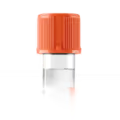Do I need a Vitamin B12 (Cobalamin) test?
Feeling exhausted, foggy, or noticing tingling in your hands and feet? Could low B12 be draining your energy and affecting your nerves?
Vitamin B12 is essential for producing red blood cells, supporting nerve function, and creating DNA. When levels drop, you may experience fatigue, brain fog, weakness, and nerve problems that can become serious if left unchecked.
Testing your B12 gives you a vital snapshot of your neurological and energy health, revealing whether deficiency is behind your symptoms so you can address it through diet, supplements, or treatment before lasting damage occurs.
Method: FDA-cleared clinical laboratory assay performed in CLIA-certified, CAP-accredited laboratories. Used to aid clinician-directed evaluation and monitoring. Not a stand-alone diagnosis.

A derived biomarker is a value that is calculated from other directly measured biomarkers rather than being measured directly in the lab.
Get tested with Superpower
If you’ve been postponing blood testing for years or feel frustrated by doctor appointments and limited lab panels, you are not alone. Standard healthcare is often reactive, focusing on testing only after symptoms appear or leaving patients in the dark.
Superpower flips that approach. We give you full insight into your body with over 100 biomarkers, personalized action plans, long-term tracking, and answers to your questions, so you can stay ahead of any health issues.
With physician-reviewed results, CLIA-certified labs, and the option for at-home blood draws, Superpower is designed for people who want clarity, convenience, and real accountability - all in one place.
Key benefits of Vitamin B12 (Cobalamin) testing
- Reveals whether your body has enough B12 to build blood and nerves.
- Spots deficiency early, before irreversible nerve damage or severe anemia develops.
- Explains fatigue, numbness, memory fog, or balance problems tied to low B12.
- Guides supplementation or dietary changes to restore healthy B12 levels quickly.
- Flags absorption problems from stomach conditions, medications, or strict plant-based diets.
- Protects fertility and supports healthy fetal brain and spinal cord development.
- Tracks response to B12 injections or oral supplements over time.
- Best interpreted with complete blood count and symptoms for accurate diagnosis.
What is Vitamin B12 (Cobalamin)?
Vitamin B12, also called cobalamin, is a water-soluble vitamin that your body cannot make on its own. You obtain it exclusively from animal-based foods like meat, fish, eggs, and dairy, or from fortified products and supplements. Once absorbed in the small intestine with the help of a protein called intrinsic factor, B12 travels through the bloodstream to cells throughout your body.
Your body's master builder for DNA and nerves
B12 plays two essential roles. First, it helps build and repair DNA, the genetic blueprint in every cell, making it critical for producing new red blood cells and maintaining all rapidly dividing tissues. Second, it protects and maintains the myelin sheath, the insulating layer around nerves that allows electrical signals to travel quickly and efficiently.
Why measuring B12 matters
Because your body stores B12 in the liver for years, deficiency develops slowly. Measuring blood levels helps detect inadequate intake, poor absorption, or increased demand before symptoms like fatigue, neurological problems, or anemia appear.
Why is Vitamin B12 (Cobalamin) important?
Vitamin B12 is essential for building red blood cells, maintaining the insulation around nerves, and synthesizing DNA in every dividing cell. Without adequate B12, your bone marrow can't produce healthy blood cells, your nervous system begins to fray, and energy metabolism stalls. Blood levels typically range from around 200 to 900 pg/mL, with optimal function generally supported in the middle to upper portion of that range.
When levels drop too low
Deficiency unfolds slowly because the liver stores several years' worth of B12. Early signs include fatigue and pale skin as red blood cells become large and fragile, a condition called megaloblastic anemia. Over time, nerve damage emerges: tingling in hands and feet, balance problems, memory lapses, and mood changes. Older adults, strict vegetarians, and people with digestive disorders absorb B12 poorly and face higher risk.
When levels climb unexpectedly high
Elevated B12 is less common and usually reflects supplementation or, occasionally, liver disease or certain blood cancers that release stored B12 into circulation. High values alone rarely cause symptoms but warrant investigation of the underlying cause.
The long view
B12 sits at the crossroads of blood health, neurologic integrity, and cellular replication. Chronic deficiency can lead to irreversible nerve damage and cognitive decline, while adequate levels support energy, mood stability, and healthy aging across the lifespan.
What do my Vitamin B12 (Cobalamin) results mean?
Low vitamin B12 levels
Low values usually reflect inadequate intake, poor absorption, or increased demand. Vitamin B12 is essential for red blood cell formation, DNA synthesis, and nerve function. When levels drop, the body may produce fewer and larger red blood cells, leading to macrocytic anemia with fatigue and weakness. Neurological symptoms can develop independently of anemia and include numbness, tingling, balance problems, and cognitive changes. Low B12 is more common in older adults due to reduced stomach acid production, in strict vegetarians and vegans, and in people with conditions affecting the stomach or small intestine.
Optimal vitamin B12 levels
Being in range suggests adequate stores to support red blood cell production, DNA synthesis, and nervous system health. Most labs define normal broadly, and optimal function is generally supported across the reference range, though some evidence suggests mid to higher-normal values may better reflect tissue sufficiency.
High vitamin B12 levels
High values usually reflect recent supplementation or, less commonly, underlying conditions such as liver disease, kidney dysfunction, or certain blood disorders. Elevated B12 itself rarely causes symptoms but may prompt investigation of the underlying cause.
Factors that influence vitamin B12 results
Results can be affected by recent B12 injections or high-dose oral supplements. Pregnancy increases demand and may lower measured levels. Some medications and medical conditions interfere with absorption or metabolism, and assay methods vary between laboratories.

.svg)









.avif)
.avif)


